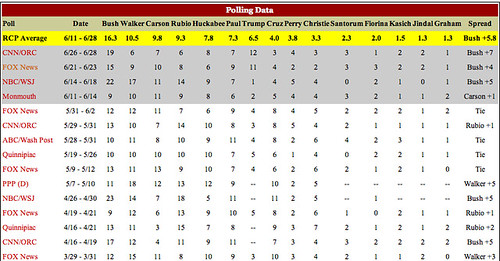Scott Walker formally entered the 2016 presidential race today, becoming the 17th (!) Republican to announce his or her intention to seek the highest office in the land. Ohio Governor John Kasich is expected to round out the exceptionally crowded field next week. As Walker officially joins the party, he maintains a relatively steady and strong polling position, as he has for many weeks:

Notably, he's led in every Iowa poll since April, and is competitive in both New Hampshire and South Carolina. In his announcement speech this evening, Walker will hammer on the central themes that have dominated his stump speeches as an undeclared candidate; he'll cast himself as "a fighter who wins," focusing on "growth, reform and safety." The Washington Examiner reports:
On growth, Walker will call for "a pro-growth economic plan that helps individuals and families earn, save, and achieve their piece of the American Dream." On reform, he will tout his reforms that "took the power from the big-government special interests and put it firmly into the hands of hard-working taxpayers." Walker will call ensuring safety a "sacred duty" of the American president and invoke President Ronald Reagan's leadership as a reminder that governors can lead on foreign policy as president. "During my lifetime, the best president on national security and foreign policy was a Governor from California," Walker is expected to say. "Under his leadership, we rebuilt our military, stood up for our friends, stood up to our enemies and — without apology — stood for American values: this led to one of the most peaceful times in modern American history." The governor will reaffirm his stance that "Government that is closest to the people is usually the best." He will tell the crowd that Washington's "power and money," should be sent back to the states, especially on key issues such as Medicaid, transportation, workforce development, and education.
Walker's electoral track record speaks for itself and his parade of successful conservative policy accomplishments -- especially in the face of extraordinary and outrageous opposition -- is nothing short of spectacular. So he has a powerful narrative with which to woo primary voters:
Which brings us to the question posed in our headline: Is Walker a frontrunner in this contest, or even the frontrunner? The polling data embedded above demonstrates that he's not at the head of the class -- that distinction goes to Jeb Bush, who's at the top of the heap, dwarfing everyone in fundraising, and positioning himself as an acceptable choice to a large majority of GOP primary voters. But Bush comes with fairly heavy baggage, both ideologically...and especially as it pertains to the ever-present "last name" issue. Will the Republican electorate ultimately decide to nominate a third member of the same nuclear family? Will they be willing to overlook potentially telling stumbles like this? If dynastic doubts begin to take root, the race to emerge as a consensus alternative to Jeb Bush will be ferocious. Walker appears to be pretty well-situated to make the case that he should be that guy: A bold conservative reformer who's been through the fire and emerged victorious -- and an effective chief executive who's shepherded through one conservative policy after the next, while winning three elections in four years. In a state that hasn't gone red in a presidential year since the 1980s, no less. Two of the early knocks on Walker are that he's "boring" (which may suit him just fine, Chris Cillizza argues), and that as the ultimate anti-panderer, he's needlessly pandered to various constituencies in recent weeks (see: Ethanol, immigration and gay marriage). Team Walker's almost shockingly candid response is that he's doing what needs to be done, politically:
"You start in Iowa and lock up conservatives, because if you don't do that, none of the rest matters," said one longtime Walker adviser, who requested anonymity to discuss campaign strategy. "It's much easier to move from being a conservative to being a middle-of-the-road moderate later on." The adviser added: "In Iowa, you see the beginnings of that. He's capturing that conservative wing first and foremost, and then moving from Iowa to the other states and bringing other voters into the fold."
A display of refreshingly honesty and clear-eyes ruthlessness? Or an indicator of cynicism and future betrayals?
